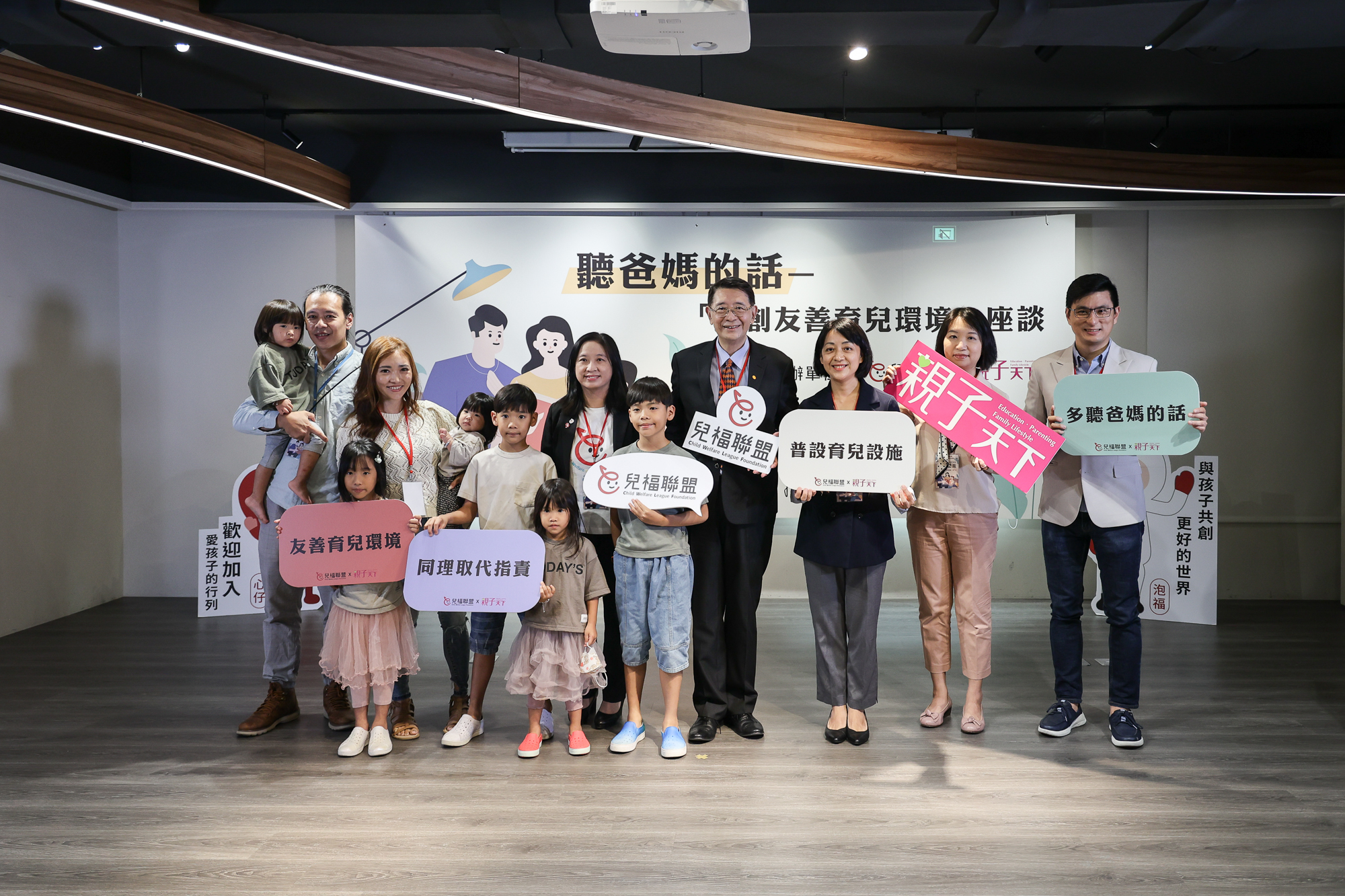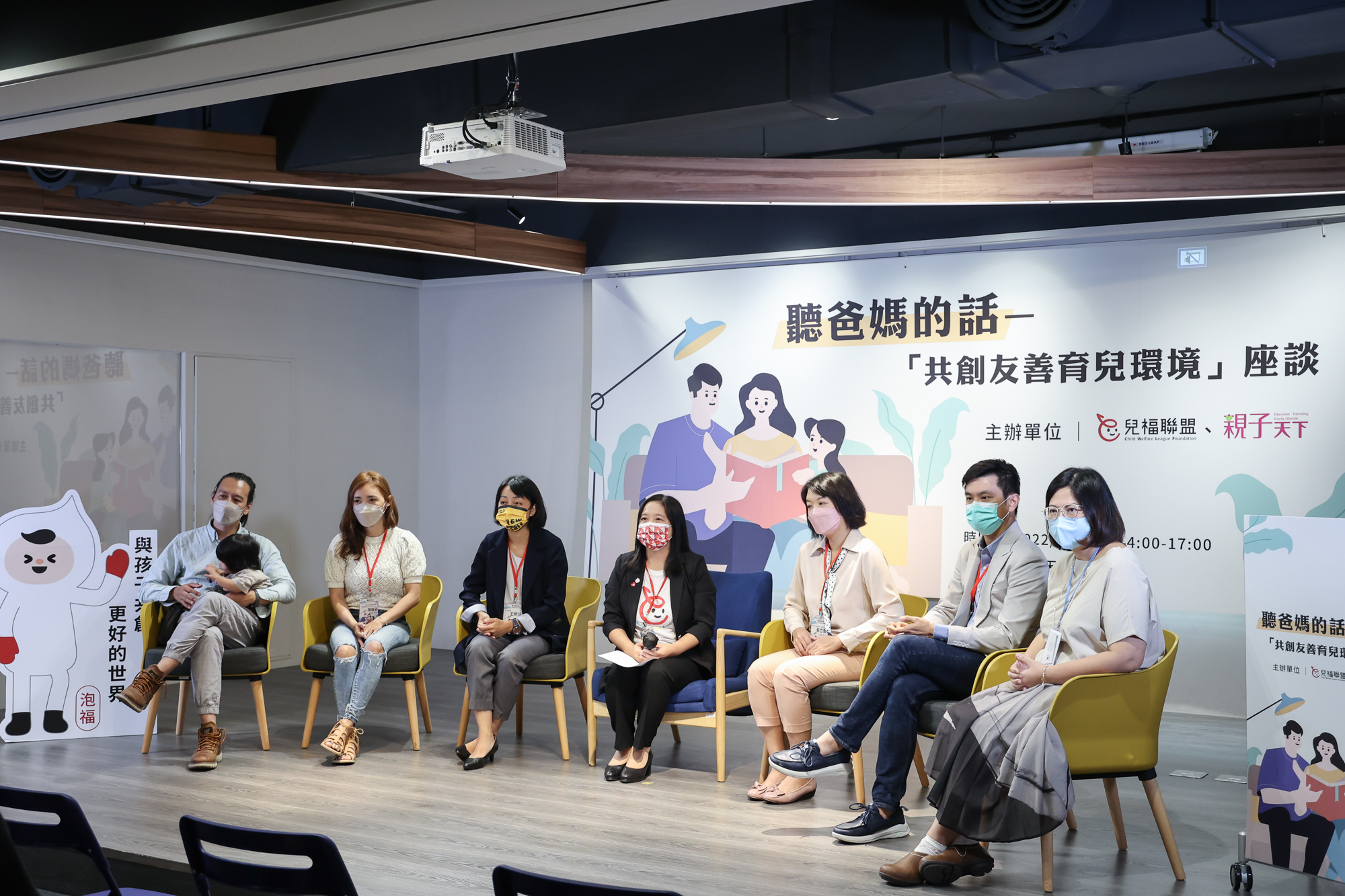
"Listen to The Parents"—Forum for “Building A Parenting-Friendly Environment”
2022-09-07
Child Welfare League Foundation (CWLF) and Parenting Magazine have both been focusing on family and parenting-related topics, together we collaborated on the forum “Listen to The Parents—Building A Parenting-Friendly Environment” today (Sep. 6th), inviting the family of the owner of a parent-child Facebook fan page “The Lins’ Kids”; Doctor Huang Cong-Ning of Mackay Children's Hospital; Associate Professor Shih Yi-Ping at the Department of Sociology at Fu Jen Catholic University; and legislator Wang Wan-Yu (Claire Wang) to share viewpoints on how to construct a friendly parenting environment regarding applying the right hardware or cultivating the positive perspective of the society. Aside from the voice of some parents on site, there is also a short clip of a message from the 2022 CWLF Friendly-Parenting Ambassador—Lin Xin-Ru (Ruby Lin) sharing that “The young friends are the best friends that make you better.” In the clip, Ruby shared that she became more patient and compassionate, thanks to having her child. She also expressed that raising a child is not an easy job, but as she saw the child gradually “unlocked” different life skills, all efforts were worth it. Lastly, Ruby fervently hoped that our society could be more inclusive. Perhaps when we hear a child crying aloud in public, we can treat those parents with more understanding, and empathy, and be more supportive.
Chairman of CWLF—Lin Jih-Jia stated during his opening speech that even though there have been several governmental funds to help parents financially, it is often neglected in cases where parents with their children were caught in an unfriendly situation. Lin wished that throughout this forum, we can gather ideas on how to create a more inclusive, benevolent environment for parents. During this forum, CWLF also unveiled the result of its survey of “2022 Focus Group on Gaps Between Expectation and Reality of Parenting—Friendly Environment”; along with the responses from parents by the Parenting Magazine to a related questionnaire “Parents’ Ideal Nurturing and Educating Blueprint—Happiness Index.”
The two reports showed Taiwanese parents’ experience and level of satisfaction, regarding the current environment through qualitative research and quantitative investigation. The Lins’ Kids is a Facebook fan page created by the parents of six children, the family also came to the forum and express their thoughts. The father Lin Hsih-Min and the mother Chen Pei-Fen shared their story of having six children, expressing that they are grateful for all the support from the government, but there is still room for more improvements. Chen further explained her problem where sometimes it is hard to find a parent-friendly parking space, and even if she did find one, the space is not wide enough for her to unload the baby carrier basket. Furthermore, discounts on transportation tickets are applicable for two children only, making it like a punishment for the parents travelling with more children.
She also emphasised her experience of some unpleasant attitudes from people around, for instance, a restaurant refused to take their reservations once heard it is a group of six children; or several hostile comments online when they shared the joyful moment of them expecting for the sixth child, saying “only those in poverty having nothing to do but having babies,” or “it is just a man who could not keep it in his trousers.” Finally, the parents urged the government to make parenting subsidies into rewards and liberalise restrictions on the wealth exclusion clauses so as not to diminish the willingness to have babies for families with a certain financial rank.
She also emphasised her experience of some unpleasant attitudes from people around, for instance, a restaurant refused to take their reservations once heard it is a group of six children; or several hostile comments online when they shared the joyful moment of them expecting for the sixth child, saying “only those in poverty having nothing to do but having babies,” or “it is just a man who could not keep it in his trousers.” Finally, the parents urged the government to make parenting subsidies into rewards and liberalise restrictions on the wealth exclusion clauses so as not to diminish the willingness to have babies for families with a certain financial rank.
Doctor Huang Cong-Ning expressed his observation when every family has its parenting route, the most obstacle occurred not on the hardware but “lacking time,” which mostly happened only a month after the child was born. The phenomenon indicated that many industries are not friendly toward those parents who were back in their position. Regardless of the fact, that a child required much time from the parents to spend time with, the right of parents to take parental leave; nonetheless, there is a large percentage of parents worried to exercise the right to do so. Therefore, it slowly becomes a familiar scene that corporations are urged to allow distance working. As a paediatrician, doctor Huang suggested parents focus on establishing a safe attaching relationship with the child so children will form good confidence. To nurture a child is to understand, empathise and give support, and they will grow up healthily, there is no need to panic and frighten yourself too much.
Professor Shih Yi-Ping also mentioned that the main reason why people nowadays would not have children lies in the unfriendly environment of society toward families with young children. Shih brought up an example that a shop would allow children to enter only if the child could recite 30 digits after the decimal point of Pi, which proves that society is putting labels on children as they are “unable to control themselves” or “will make a mess.” Shih further disclosed her observation on how to create a friendly environment for parents using the example of family restaurants. Even though family restaurants provide families with children a venue to freely enjoy their time, but somehow means that families with young children can only do so in such places. Only sorting out the issue of our society being unfriendly to those families using methods of business-based thinking is far from enough to build a mutual understanding atmosphere between parenting families and those without children. The professor also brought up the issue of gender inequality, in which she found that preschool children affect the mother more than the father. To change the situation, Shih suggested that more flexible working hours and school hours would allow parents to arrange their time so that they could better balance work and family without giving up either their careers or spending time with their children.
Legislator Wang Wan-Yu, who came to the forum, expressed her concern that our government has given several financial subsidies to parents, however, the illogical wealth exclusion clauses caused an impact on couples considering whether to have children. The burden of having children is tremendous. Assumingly, parents with a monthly salary of a hundred thousand NTD are likely to spend one-third to even half of which on afterschool care. Only providing support on the financial side, not the hardware nor cultivating a positive attitude in our society is hard to make people more willing to give birth. Claire would urge the government to put more effort into changing the traditional cultural frame on parents and better implement gender equality. Parenting-friendly should include everything from transportation, public venues, parenting education, child rights, living environment, the atmosphere in the society etc.
At the final Q&A session, a parent with a disabled child spoke from their personal experience of the problem where they can barely find a proper parent-child toilet or barrier-free space, the circumstances of people with special needs should also be included during policy making. The words gained the CWLF, the legislator and all experts’ praise, and echoed the topic of this forum which we ought to “listen to parents,” and CWLF will continue to organise similar forums related to the low birth rate to respond to parents' needs.
CWLF “2022 Focus Group on Gaps Between Expectation and Reality of Parenting—Friendly Environment”
Early this year (2022) CWLF invited couples with one child and couples without children to join the four focus groups to collect the thoughts from these parents about their expectations of having children and experience of actually having a child. CWLF pointed out from these responses of parents that the two major downsides of the current situation in Taiwan are “unfriendly hardware facilities” and “unfriendly attitude in the society.”
1. Unfriendly hardware facilities make taking children out like running an obstacle course.
Parenting families mentioned their daily life when taking their children out; lacking hardware facilities or equipment is always discussed. For instance, almost impossible to book a train ticket for the family carriage; there is no baby changing station in the men’s room in public places; family parking spaces occupied by others or the parking space is too narrow to get on and off for baby supplies. Furthermore, very few outdoor playing spaces are suitable for children, especially in urban areas; and there are even fewer parks or public facilities for parenting families to take children to, which affects the balanced development of children physically and mentally.
2. Unfriendly attitudes in society, parenting families have to bear with huge stress.
Except for the hardware issues, parenting families inevitably have to ponder about how passers-by see themselves and their children when the family goes out to dine or go in public. In some awkward cases, if the child started to cry and if the passers-by had lower tolerance or tried to intervene and criticised, parents would need to care about their children while processing complaints and blames from strangers aside. Those couples with no children expressed the same concern, even though they had not had children they could relate already to what parenting families are going through; the atmosphere in our society toward parenting families. They also expressed their doubts about whether being able to bear the stress once they had their own children.
The CEO of CWLF—Pai Li-Fang told during the forum that a survey conducted in 2012 has shown the three major problems for parents of young children, “Hard to walk, hard to toilet, hard to travel.” And which result facilitated the amending of the “The Protection of Children and Youths Welfare and Rights Act.” The act especially added several articles on parking spaces for pregnant women and parenting families, parent-child toilets, parent-child carriages and etc. However the protections on the legal side, the actual improving speed is far from expectations and the parents’ actual needs. The survey done in 2017 by CWLF discovered the fact that nearly 60% of mothers felt the surrounding environment unfriendly, and it’s stressful to take children to public places. The focus group “Gaps Between Expectation and Reality of Parenting” of CWLF also found that many parents still find the current parenting environment not friendly enough, even though the progress legal-wise, the establishment of more parent-child friendly facilities… but there is a mismatch between the expectation and the actual outcome, where there are still not enough parent-child carriages and parking spaces arranged are still not wide enough. Therefore, CWLF urges the government to set up hardware facilities based on the true needs of parents, with the aim to create a more compassionate, more understanding society for parenting families, so that Taiwanese couples can have babies without so much to worry.
The survey of “Parents’ Ideal Nurturing and Educating Blueprint” from Parenting Magazine
The Parenting Magazine conducted an online survey of “Parents’ Ideal Nurturing and Educating Blueprint” among parents with at least one child this July. In 1336 collected questionnaires, three major points were brought out:
1. Regardless of how hard it could be to keep a family happy, having children will surely make a family happier.
According to the results from the survey, nearly 67% (66.84%) of parents considered it hard to maintain family happiness. Most parents felt happy because having children, close to 85% (84.73%) of parents thought having children makes them happier. An interesting fact found after cross-analysis of the two feedbacks is that those parents who agreed that happiness came from having children, had more happiness in their marriage as well
.2. Mothers had less happiness in their marriage and parenting compared to fathers.
From the survey, we noticed that women felt far less happy in a family. When it comes to whether they agreed on the statements such as “It is not difficult to maintain family happiness.”; “It is happier to have children.”; “If there were a second chance, I would still get married.”; or “If there were another chance, I would still have children.”, mothers were less agreeable than fathers. This outcome proves that mothers were less happy than fathers, in marriage and during parenting.
3. Friendliness toward parenting of the society is rated as failed by parents.
Apart from the happiness in the family, we intended to understand whether parenting families felt supported by the outer environment. Through the survey, the parents gave 3.28 points out of five to the government’s policies to encourage having babies; 3.07 points to the working environment; and only 2.62 points to society and people’s positive attitude. If three points were set as the standard for passing scores, the lowest point of all three topics showed the positivity of the society, which is obviously failing.
The deputy editor of Parenting Magazine—Su Dai-Lun expressed from the long observation conducted by the magazine that society is not friendly toward parenting families on several terms. For instance, some restaurants do not allow babies or young children to enter; parents were asked to leave the carriage on HSR because their baby was crying… These examples indicated that bystanders were not compassionate enough to families with children. Su stated that we used to see having a child as that family’s own business, while it actually takes a whole village to raise a child, and every child is the future of the country and the pillar to having a happy family. She urges workplaces, society, and the country to provide parenting families proper support so that Taiwan can become a parenting-friendly country. It takes the whole village’s effort to raise a child, and we ought to make parenting a pleasant part that makes us all happy.
CWLF with the Parenting Magazine jointly appealed for three major points for all to work on 1. Widely establish parenting facilities 2. Empathise rather than criticise 3. Listen more to the parents’ words
The reports from CWLF “2022 Focus Group on Gaps Between Expectation and Reality of Parenting” and “Parents’ Ideal Nurturing and Educating Blueprint” of Parenting Magazine reflected the unkind social environment for parenting families and families yet to have children but planning to, causing an invisible psychological pressure for them. CWLF and the Parenting Magazine urged the government the following three points to pay attention to the needs of parents, and respond to their dilemmas and expectations so that Taiwanese parenting families could get stronger support:
1. Widely establish parenting facilities
Although exclusive parking spaces for pregnant women or families with children, parent-child washrooms, and parent-child carriages were obligated according to the law, the actual situation of those hardware facilities being implemented cannot be told. It is suggested that the government could conduct a full-scale, national-wise inventory of all the parenting facilities, and improve areas with poor settings to increase the penetration rate of childcare facilities so that parents can take their children without care.
Although exclusive parking spaces for pregnant women or families with children, parent-child washrooms, and parent-child carriages were obligated according to the law, the actual situation of those hardware facilities being implemented cannot be told. It is suggested that the government could conduct a full-scale, national-wise inventory of all the parenting facilities, and improve areas with poor settings to increase the penetration rate of childcare facilities so that parents can take their children without care.
2. Empathise rather than criticise
When encountering parents taking their children out in public, please be more patient, courteous, tolerant, and be more supportive so as to enhance the overall friendly atmosphere toward parenting, and let every parent out with their children can sense the compassion and kindness from every corner of our society.
When encountering parents taking their children out in public, please be more patient, courteous, tolerant, and be more supportive so as to enhance the overall friendly atmosphere toward parenting, and let every parent out with their children can sense the compassion and kindness from every corner of our society.
3. Listen more to the parents’ words
To examine the parenting policies introduced by the government in recent years, most of them focused on parenting or childcare subsidies, however not enough attention was paid to the friendliness of public spaces. It is suggested to take the parents’ points of view and invite more parents to participate when the government is formulating related laws, by that to establish more friendly public spaces and reduce the pressure for parents to go out with their children.
To examine the parenting policies introduced by the government in recent years, most of them focused on parenting or childcare subsidies, however not enough attention was paid to the friendliness of public spaces. It is suggested to take the parents’ points of view and invite more parents to participate when the government is formulating related laws, by that to establish more friendly public spaces and reduce the pressure for parents to go out with their children.



